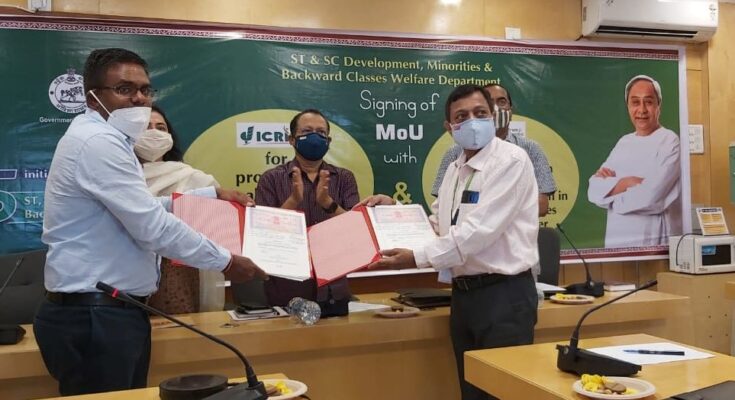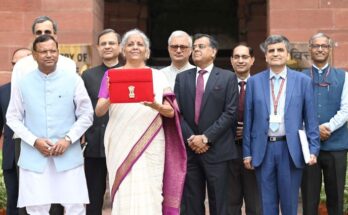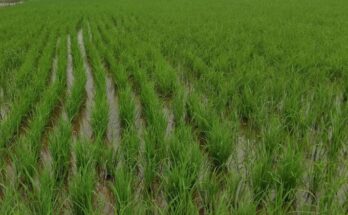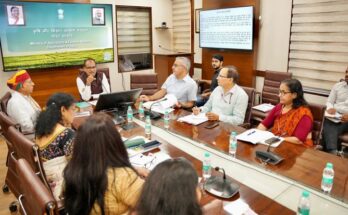Government of Odisha is collaborating with the International Crops Research Institute for the Semi-Arid Tropics (ICRISAT) to strengthen management of natural resources for the benefit of the state’s Particularly Vulnerable Tribal Groups that are dependent on agriculture. Accordingly, ICRISAT will undertake capacity building initiatives, water harvesting, recording of hydrological parameters and crop productivity in addition to monitor land-use as well as land-cover through remote sensing and GIS in 12 districts of the state.
“The main objective of this collaboration is promoting sustainable integrated natural resource management through capacity building and monitoring. The period of agreement is for three years and the area of intervention is spread over 12 districts,” said PK Jena, Development Commissioner and Additional Chief Secretary, Government of Odisha, during signing of the partnership agreement in Bhubaneshwar on Tuesday.
The collaboration is a part of Odisha’s Particularly Vulnerable Tribal Groups Empowerment and Livelihoods Improvement Program (OPELIP), which is funded by the UN’s International Fund for Agricultural Development (IFAD). OPELIP aims to develop integrated approaches for improved access to natural resources, agriculture technologies and other services in the state’s 12 districts where populations of Particularly Vulnerable Tribal Groups (PVTG) reside. These districts are Sundargarh, Mayurbhanj, Debagarh, Kendujhar, Angul, Nuapada, Kandhamal, Kalahandi, Raygada, Gajpati, Ganjam and Malkangiri.
“Our partnership with the Government of Odisha has steadily enhanced the living conditions for particularly vulnerable tribal groups. Together, we have helped improve agricultural practices and productivity as well as food and nutrition security. I am confident that this partnership with ICRISAT will help ensure that the lands and forests these communities rely on are managed sustainably, securing their livelihoods for generations to come,” said Ulaç Demirag, Country Director, IFAD India.
The new collaboration will also see ICRISAT develop rainwater harvesting structures and setting up gauging stations to record rainfall, run-off and other hydrological parameters in four districts where Jhum or shifting cultivation is practiced.
“ICRISAT will use its expertise in hydrology and its strong capabilities in remote sensing and GIS techniques. In all of ICRISAT’s past and current partnerships, capacity development has been a vital component– across the farming community, government functionaries and NGO partners– as it is crucial for delivery of required outputs,” said Dr. Jacqueline Hughes, Director General, ICRISAT. “Assessment and monitoring are also critical to ensure achievement of objectives. ICRISAT will support the Government of Odisha’s efforts to ensure outputs and outcomes are delivered in a timely manner.,” the ICRISAT DG added.
Government of Odisha and ICRISAT have been partnering for a decade for the benefit of the state’s smallholder farmers and agriculture. The partnership is a holistic approach to enhance crop productivity, improve incomes and better nutritional outcomes by making agriculture climate-resilient and sustainable.
Some of the collaborative efforts underway include development and promotion of improved varieties of pigeonpea, groundnut and chickpea; monitoring and improvement of soil health under the Bhoochetna Project that has already demonstrated yield increases in the range of 20-60 percent across the state; and supporting the Odisha Livelihood Mission in a multifaceted manner, ICRISAT said.
“We are very hopeful about the outcomes of the new initiative and are looking forward to it. We hope that this partnership will add to the socio-economic development of particularly vulnerable tribal groups in Odisha. We would like to see if this can be replicated in other areas or micro-projects as well,” said Ranjana Chopra, Principal Secretary, ST & SC Development, Minorities and Backward Classes Welfare Department, Government of Odisha.
Dr. AB Ota, Special Secretary and Director ST & SC Research and Training Institute, Odisha; P. Arthanari, Project Director, OPELIP and ICRISAT scientists Dr PK Mishra and Dr KH Anantha were present during the exchange of agreements. Dr. Hughes; Dr. Arvind Kumar, Deputy Director General-Research, ICRISAT; Dr. Arabinda Padhee, Director, Country Relations, ICRISAT; Dr. Pooran Gaur, Senior Consultant, ICRISAT and Dr. Sreenath Dixit, Head, ICRISAT Development Center joined the MoA signing virtually.




